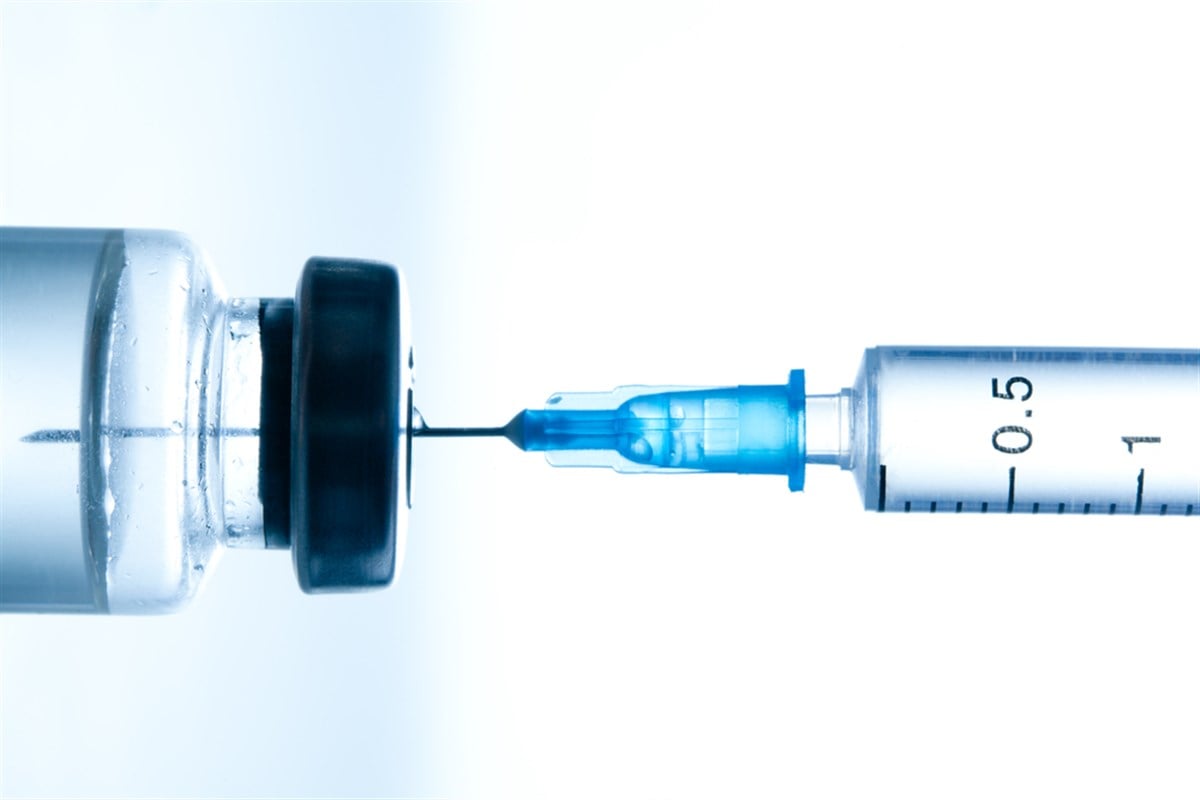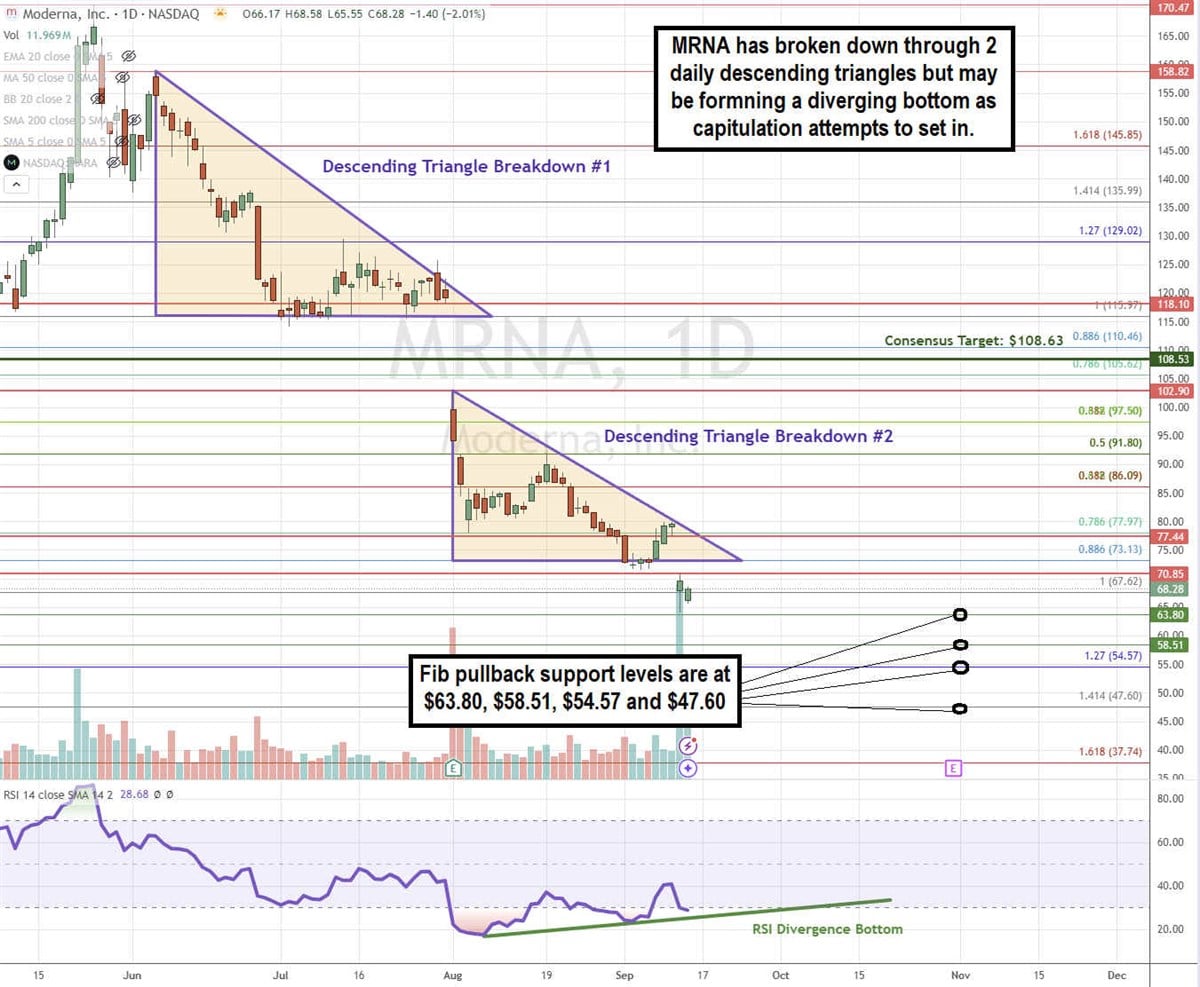
Moderna Inc. (NASDAQ: MRNA) made headlines during the pandemic for its messenger ribonucleic acid (mRNA) technology used in its COVID-19 vaccine Spikevax. mRNA vaccines deliver a virus's blueprints or genetic instructions to the cells to trigger the immune system to make antibodies to protect against it. MRNA stock peaked at $497.40 on Aug. 9, 2021, as its COVID-19 vaccines generated over $36 billion in revenue.
However, COVID-19 vaccine sales have fallen by more than 90%. Moderna went from making billions to losing billions of dollars. The medical sector company lost $1.3 billion on revenue of just $241 million in its second quarter of 2024. Moderna announced on its R&D Day plans to trim its R&D budget by $1.1 billion by 2027, sending its stock to 10-month lows. For bullish investors, here are four reasons to buy this dip.
1) Portfolio Prioritization Is a Positive
Moderna will implement portfolio prioritization by discontinuing five programs in its pipeline, including mRNA-1287, mRNA-5671, and mRNA-1345. It's prioritizing the development and FDA approval for 10 drugs with the potential for approval by 2027. The company has $10.1 billion in cash and cash equivalents. It has to get the most bang for its buck. Therefore, it only makes sense to conserve some money and prioritize commercializing its pipeline as soon as possible.
Implementing portfolio prioritization and cost efficiencies will reduce its R&D expenses by $1.1 billion from $4.8 billion in 2024 to $3.6 to $3.8 billion by 2027. Moderna expects to have $9 billion left in cash at the end of 2024, down from the $13.3 billion it started the year with. By the end of 2025, it expects cash to swing to the $6 billion to $7 billion range.
2) Moderna Received FDA Approval for Its RSV Vaccine
Moderna received FDA approval for its RSV Vaccine mRESVIA (mRNA-1345) on May 31, 2024. It's used to protect adults aged 60 and older from lower respiratory tract disease caused by respiratory syncytial virus (RSV). Analysts expect it to generate sales of $370 million in 2024. Moderna did trim 2024 sales estimates by $500 due to lowered COVID-19 vaccine sales in the European Union (EU) in 2024 and revenue deferrals into 2025.
3) Moderna’s Remaining Pipeline Remains Robust
Moderna has five vaccines in Phase 3 clinical trials. It expects to submit three for FDA approvals in 2024. Moderna also has five non-respiratory drugs in its pipeline, undergoing pivotal studies with potential approval by 2027 across cancer, rare diseases, and first-in-class latent vaccines. Moderna plans to launch its mRNA cancer vaccine (mRNA-4157) for skin cancer in 2025. It's a personalized cancer vaccine therapy that is combined with Merck & Co.'s (NYSE: MRK) blockbuster Keytruda, an anti-PD1 treatment. Moderna has a 50/50 global profit-sharing split with Merck on mRNA-4157 for individualized neoantigen therapy for various cancers, including melanoma, renal cell, cutaneous squamous cell, and bladder cancer.
4) MRNA Stock Is Forming a Divergence Bottom
A divergence bottom forms when the relative strength index (RSI) reaches a higher inflection point. For example, the RSI turns up at the 10-band to the 40-band, then turns down to the 30-band, and then up at the 35-band. The divergence bottom can be identified by connecting a trendline between the two inflection points.

MRNA stock is coming off two descending triangle breakdowns. The first started at $158.82 and broke down through the flat-bottom support at $115.97 following its Q2 2024 earnings report on Aug. 1, 2024. The second descending triangle breakdown triggered the breakdown under the $73.13 flat-bottom support following the R&D Day announcement of the $1.3 billion budget cut and cost-cutting plan.
Fib pullback support levels are at $63.80, $58.51, $54.57 and $47.60.
Moderna’s average consensus price target is $108.63, and its highest analyst price target sits at $179.00. Morgan Stanley lowered its price target to $94.00, and Piper Sandler lowered their target to $115.
Actionable Options Strategies
Bullish investors can buy dips on shallow pullbacks using cash-secured puts at the fib pullback support levels. Bullish options investors can limit maximum downside and profit from potential stock price gains with less capital than owning the stock by implementing a bullish call debit spread.





